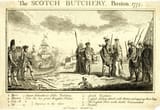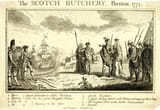Anonymous
 9/6/2025, 2:25:36 PM
No.514950944
9/6/2025, 2:25:36 PM
No.514950944
Friendly reminder that most englishmen agreed with the revolution, see the gordon riots
The tories who fought against the revolutionaries were primarily scottish which is funny when americans larp as scots when the founding fathers despised scots for being tories
Anonymous
 6/27/2025, 3:49:59 PM
No.508871890
6/27/2025, 3:49:59 PM
No.508871890
Politically speaking why do americans love braveheart and LARPing as scottish if the early americans hated scots so much?
Historically speaking why did early americans hate the scottish so much?
>The situation in the colonies in early 1776 also provided a background against which Highlanders could easily be thought of as a threat to the cause of independence. Lowland Scotch and Scotch Irish were in the forefront of the move for independence, but Highlanders probably were more loyal to the Royal cause, and more ready to take up arms against rebellious colonists, than were any other ethnic group. A gentleman of Philadelphia wrote on May 18, 1776, to a friend in England: "Believe me, Sir, these [demands for independence] are the sentiments of all degrees of men in British America, a few tattered Scotch Highlanders excepted, who have lately emigrated, and whose ignorance, feudal notions and attachment to names> keeps them servile and wholly at the beck of their Chiefs. .. . In this Province, English, Scotch, and Irish, are equally engaged in the great cause of liberty. Indeed many of the Scotch have particularly signalized themselves in the cause of freedom."
>The British authorities made the most of this local situation. In early 1776 Highlanders were active with the forces of Sir John Johnson in the Mohawk Valley, and some 300 were forced to throw down their arms by General Philip Schuyler.10 In North Carolina Highlanders made up a large part of a Tory force raised by Governor Martin that was defeated by colonial militia at Moore's Creek on February 27, 1776. News of the Highlanders' defeat reached General Washington at Cambridge, and in a letter of April 1, 1776, to Joseph Reed he spoke of "those universal instruments of tyranny, the Scotch."11


